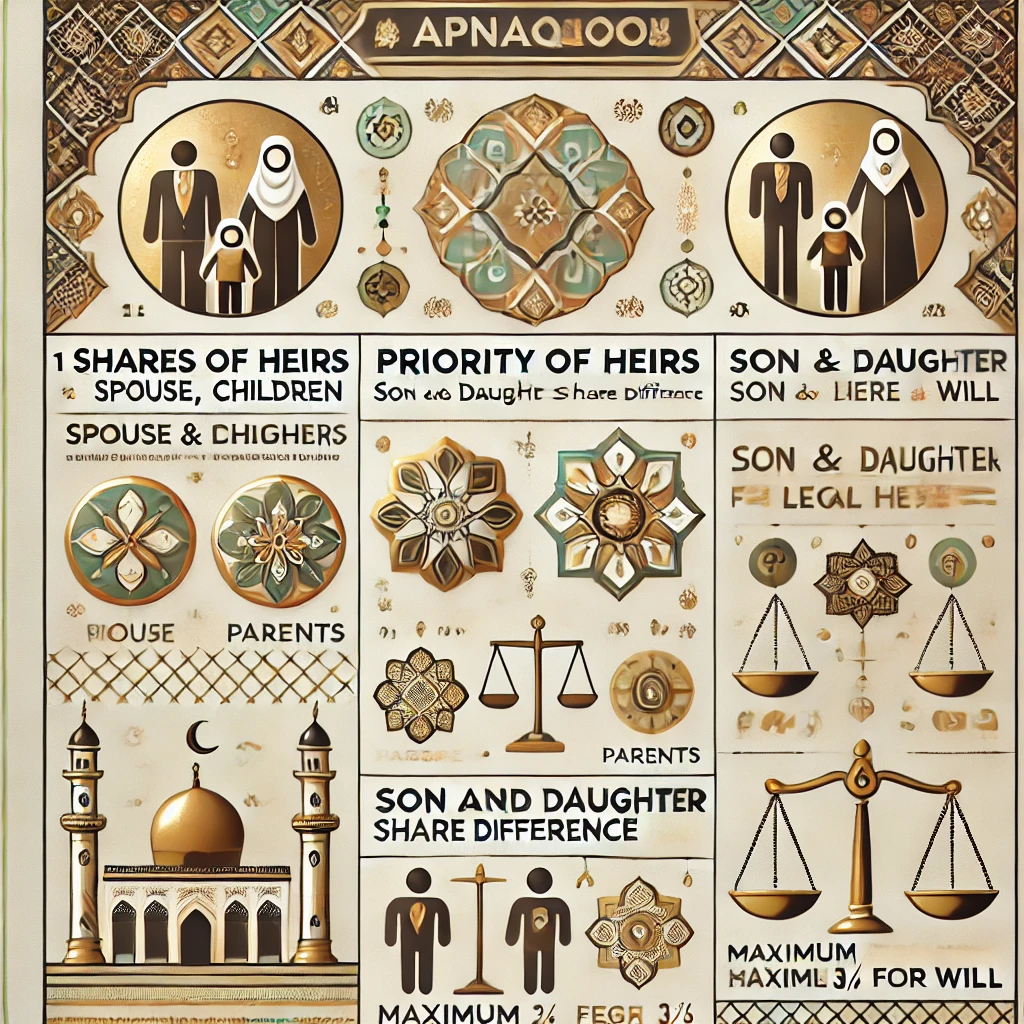Inheritance under Muslim Law: Principles and Rules
Inheritance under Muslim law is a well-defined area of Islamic jurisprudence, governed primarily by the Quran, Hadith (sayings of Prophet Muhammad), and Ijma (consensus) of scholars. The rules of inheritance in Muslim law are largely codified in the Muslim Personal Law (Shariat) Application Act, 1937 in India, though the laws may vary slightly in different countries or regions depending on local interpretations and practices.
1. General Principles of Inheritance
The principle underlying Muslim inheritance is the division of property after a person’s death among legal heirs, based on clear proportions prescribed in the Quran and Sunnah. Muslim law seeks to distribute the deceased’s estate in a way that ensures that family members are taken care of, avoiding unnecessary disputes over property distribution.
Key Features of Inheritance Under Muslim Law
- Fixed Shares: The Quran outlines fixed shares for each heir. The heirs are generally divided into two categories: those who inherit fixed shares (like parents, spouses, and children) and those who inherit through the principle of agnatic succession (like brothers, sisters, etc.).
- Sharia Law governs inheritance: The general rules of inheritance for Muslims are derived from Sharia law, and there are specific quotas or fractions for each legal heir.
- Precedence of Heirs: The heirs are prioritized in a specific order:
- First Priority: Spouse, children, and parents.
- Second Priority: Siblings, grandparents, and others.
- Gender-based Differences: In general, Muslim law differentiates between male and female heirs. For example, a son inherits twice as much as a daughter from the same share, based on the Quranic injunctions. However, women are entitled to inheritance, which was a progressive measure in comparison to pre-Islamic practices.
2. Categories of Heirs in Muslim Law
The heirs under Muslim law are classified into two categories:
- Sharers (Asabah): These are the heirs who inherit fixed portions as prescribed by the Quran.
- Parents: Both the father and mother are entitled to fixed portions. The father gets 1/6th of the estate, while the mother gets 1/6th, provided the deceased has children.
- Spouse: The husband receives 1/4th of the estate if the deceased has children and 1/2 if the deceased has no children. The wife receives 1/8th if the deceased has children and 1/4th if there are no children, further check Child Custody Laws in USA.
- Children: Sons inherit twice the share of daughters. For example, if there are two sons and one daughter, the sons would get 2/4th each, and the daughter would receive 1/4th.
- Residuaries (Asabah with al-‘Aqil): These heirs inherit the residual estate after the fixed shares have been distributed. This category includes the male heirs (like brothers, uncles, etc.) and sometimes female heirs if there are no direct sharers.
3. Share Calculation in Muslim Inheritance
The share of each heir is calculated as per the prescribed fractions in the Quran. A typical example might look like:
- A man dies, leaving a wife, a son, and a daughter.
- The wife gets 1/8th of the estate (since there are children).
- The remaining estate (7/8ths) will be divided between the son and daughter, with the son receiving twice the share of the daughter.
4. Conditions of Inheritance Under Muslim Law
- Intestate Succession: In Muslim law, inheritance takes place only when the deceased dies intestate (without a will). A will (Wasiyyat) can be made, but it is limited to a maximum of 1/3rd of the estate, which can be bequeathed to non-heirs or charitable causes. The remaining 2/3rd is distributed among legal heirs.
- Legitimate Heirs: Only legally recognized heirs under Muslim law can inherit. This includes biological children, parents, siblings, and spouses, but excludes non-Muslim relatives or non-legitimate children (unless specifically stated in a will).
5. Recent Case Laws on Inheritance Under Muslim Law
The legal framework for inheritance under Muslim law has evolved with time, especially with changes in personal laws in various countries. In India, the Muslim Personal Law (Shariat) Application Act, 1937 governs inheritance, but various case laws have shaped its application.
Case Law 1: Mohd. Jameel vs. Union of India (2023)
In this case, the Supreme Court of India ruled on the application of Muslim personal law in the context of inheritance. The case specifically dealt with the issue of whether a woman could inherit from her paternal family even if the family members were unaware of her inheritance rights. The Court reiterated the importance of Muslim personal law and held that women heirs are entitled to their rightful share, even if the male heirs were unaware of this due to cultural reasons. It emphasized the relevance of Sharia law and women’s rights in inheritance.
Case Law 2: Mohammad Usman and Another v. Shafiya Begum (2022)
This case revolved around a dispute between two heirs regarding the rightful share of the estate left by a deceased Muslim man. The Court ruled in favor of ensuring that the division of property adhered strictly to the Quranic principles, especially regarding the differing shares between male and female heirs. This judgment reinforced the gender-specific inheritance provisions outlined in the Quran.
Case Law 3: In Re: Legal Rights of Muslim Women in Inheritance (2021)
This case addressed the challenges faced by Muslim women in securing their inheritance due to social norms and cultural biases. The Court directed that any unjust practice hindering women’s access to inheritance must be rectified, ensuring that Shariat-compliant inheritance laws are upheld in a more transparent manner. This case set a precedent in encouraging awareness about women’s rights to inheritance under Muslim law.
Muslim inheritance law provides a clear and structured framework for distributing the estate of a deceased, emphasizing fairness and justice among heirs. While the laws are based on Sharia, they have been subject to judicial scrutiny in several countries to ensure that heirs, especially women, receive their due share in an equitable manner. Recent case laws highlight the continued importance of Shariat in ensuring that inheritance rights are respected and followed, making Muslim inheritance law a vital part of personal legal systems in many countries.









